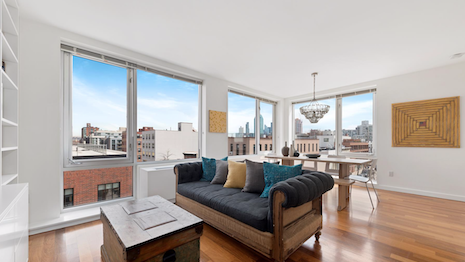- About
- Subscribe Now
- New York,
October 2, 2019

 Manhattan continues to face a weak real estate luxury market. Image credit: Douglas Elliman
Manhattan continues to face a weak real estate luxury market. Image credit: Douglas Elliman
Luxury real estate sales in New York continued to fall as inventory increased in the third quarter of 2019, but there are indications that the market could turn around in the coming months.
An updated mansion tax went into effect at the start of the third quarter, impacting sales before and after its implementation. Buyers are also showing interest in smaller units, according to reports from both Douglas Elliman and Core.
“Though we saw sales decline rather significantly this quarter, it’s important to keep in mind that many sales were achieved over the summer by buyers rushing to file ahead of the mansion tax deadline on July,” said Steven James, president/CEO of Douglas Elliman, New York. “The combined sales for the second and third quarters of 2019 are only down slightly from the same time period last year, and I suspect that with mortgage rates remaining low and sellers loosening their hold on unrealistic pricing positions, the largest declines are behind us.”
Summer slowdown
New York’s luxury real estate market, particularly in the borough of Manhattan, has been struggling in recent quarters.
According to Douglas Elliman’s Q3 2019 Market Reports for Manhattan and Northern Manhattan, the number of sales in Manhattan dropped 14.2 percent from the third quarter of 2018 to 2,562.
Inventory in New York continues to increase. Image credit: Core
Year-over-year, the median sales price in Manhattan fell 8.2 percent to $1,025,000 and the average sales price decreased 14.1 percent to $1,656,395. Inventory also grew for the eighth straight quarter to 7,352 listings, up more than 6 percent – the largest annual percentage increase in five years.
Real estate brokerage firm Core’s Q3 Manhattan report shared similar findings, but noted contract activity increased 9 percent year-over-year.
Sales of the highest-priced listings and new developments are especially sluggish.
Core found that sales of homes priced above $20 million fell by a third, while new constructed condos spent an average of 349 days on the market. The average marketing time in Manhattan is 193 days.
Less than 10 percent of property sales were above $3 million, according to Core. This is despite almost 30 percent of inventory being priced above $3 million.
Homes stay on the market for an average of 193 days. Image credit: Core
“While prices have certainly come down, the average and median sale prices are more a reflection of what price points are trading, and right now, activity is concentrated well below $3 million,” said Garrett Derderian, managing director of market analysis at Core, New York. “Buyers are looking for more efficient units.”
This echoes Douglas Elliman’s findings, which showed that the average size of a luxury new development sale fell year-over-year by nearly 900 square feet. The price per square foot also declined more than 5 percent to $1,542.
Real estate challenges
Luxury home sales in New York fell 5 percent over the first half of the year, even with a revised mansion tax acting as an incentive for buyers to finalize purchases.
As of July 1, the city’s mansion tax – which applies to sales of at least $1 million – begins at 2 percent and rises incrementally up to 3.9 percent for sales of $25 million or more. Previously, the tax had been 1 percent (see story).
High taxes and driving costs are also pushing consumers out of pricey metro areas into less populated cities with lower income taxes, as many tech companies move their headquarters outward as well.
According to a report from Redfin, Phoenix, AZ has seen the greatest influx of the real estate firm’s users in the past quarter as those in big metro areas such as New York and Los Angeles are no longer holding on to long-term residences. Another report from Realtor.com shows that Grand Rapids, MI boasts the hottest zip code at the moment and big cities have lowered on its rankings (see story).
“Typically, the fourth quarter is the slowest in terms of sales, and the weakest for pricing,” Core’s Mr. Derderian said. “The new mansion tax will continue to take a toll on the housing market as buyers evaluate the impact on their finances.
“In many ways, we have seen another shift in buyers’ preferences,” he said. “After the recession, buyers wanted to move downtown from the Upper East and West markets, which was perceived as ‘trendy’ in to larger ‘loft-like’ spaces.”
Share your thoughts. Click here